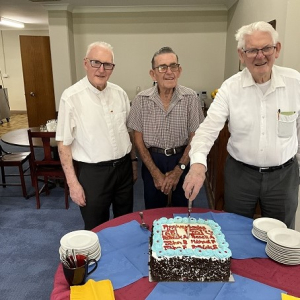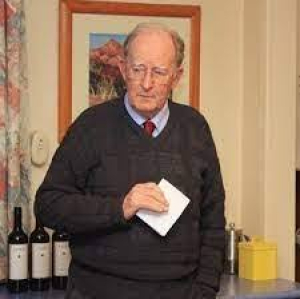Peter MALONE
Eulogy/ Homily, Requiem Mass for Reg Pritchard MSC
Eulogy/ Homily, Requiem Mass for Reg Pritchard MSC
Brother Reg was a deeply private person, but above all a deep man. A man of deep faith who was most faithful to prayer.

I've heard it said that if you want to get to know someone go on holidays with them. On that score Reg and I, usually along with a few others like Terry Barry and Gus Buckley, spent many months over the years on some most memorable holidays during which I came to know Reg rather well both in our conversations and more particularly in many long silences. I recognise the man I got to know within our first reading today from the Book of Job (Jb. 19:1, 23-27) where Job is remonstrating with his friends and with God. Job has been shown certain things in faith - for faith is a way of knowing - a way that quite surpasses our natural ability to discover things by our own reasoning.

If Job's words could be preserved for a future generation he knows already that they will be proved true. Having known Reg at close quarters concerning our mutual faith I know too that Reg was very much gifted with that "knowing faith" of Job which both surpassed and was not in need of the arguments of human reasoning. Specifically that he knew God is my redeemer - my goel - my intimate relative and I shall look on him and he on me face to face.

Reg shared this mystique with our MSC brothers in general. Indeed as an alumnus of St Paul's Seminary which had been conducted in this place and within which the role of the brothers was significant I have observed that whenever attending a reunion of priests formed here and a speaker has mentioned the brothers that remark has immediately prompted a standing ovation, No further words are necessary nor would any be adequate.
Our responsorial psalm today was a combination of Psalms 42 and 43; It is an intensely personal prayer, yet one offered in the name of the community, which echoes the Reg I knew. Those whose prayer is deepest seem also to touch the greater number of us from within so to speak.

Turning to the Gospel of John (Jn.6:37-40) we were told that the Son's tender invitation to us turns on the almighty strength of the Father's will, or as St Francis de Sales put it "There is nothing so strong as tenderness and nothing so tender as real strength". Despite Reg's gruff exterior those of us who knew him well could recognise a most tender person within.
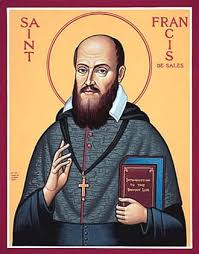
I am reminded of an observation of the former atheist and madly daring victoria cross winner of World War II, Sir leonard Cheshire, who after the bombing of Hiroshima (at which he was Britain's official observer) underwent a profound conversion so as to become in later life a recognised spiritual authority; he was once asked in what did he consider the genuinely masculine to consist; He calmly replied, "there is a certain relentless tenderness about the genuinely masculine". I detect Reg Pritchard being described in those words.
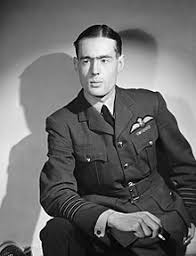
We have just heard proclaimed that it is the almighty Father's will that nothing he has given to the Son will be lost and the Son will never cast out anyone the Father gives him. Like Job, Reg Pritchard simply knew that by way of a calmly held faith.
Edmond Travers MSC

Photos from Kensington – Anniversary celebrations
Photos from Kensington – Anniversary celebrations

Pat Austin, Russell Andersen, Michael Fallon

Patrick Sharpe with Albert Chan and Russell Andersen

The Kensington dining room in celebratory mode

Jim Littleton with his brother John and John's wife, Mary June
And thanks to Barry Smith MSC for the photos
Honouring Jim Littleton MSC, 95.
Honouring Jim Littleton MSC, 95.

This photo of Jim has appeared a number of times, but it shows Jim at his best.
Jim Littleton has been a significant member of the Australian Province for almost 80 years.
His main ministry has been in Education, teaching at the Apostolic School when ordained, serving as Principal at Downlands College, Chevalier College and Daramalan College.

He also served as Provincial Superior, 1987-1992.

He compiled books on Deceased MSC, and for the last 15 years, he has written 28 monographs on significant MSC personalities and MSC formation houses and parishes.

He lived in Canberra at the Daramalan Residence for many years, seen here with Harold Baker MSC. In 2020, he moved to Kensington Monastery.
Lord of the Ants/ Il Signore delle Formiche
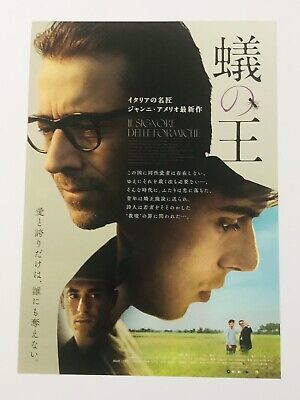
IL SIGNORE DELLE FORMICHE/ LORD OF THE ANTS
Italy, 2022, 132 minutes, Colour.
Luigi lo Cascio, Elio Germano, Leonardo Maltese.
Directed by Gianni Amelio.
Drama dealing with issues of sexual orientation in Italy in the 1950s and 1960s. Reviewers note that the director, the veteran Gianni Amelio, a leader in Italian cinema for many decades, came out later in life and this permeates his treatment of the story of an Italian academic, Aldo Briaibanti, who was arrested in the late 1960s and charged with the crime of “plagiarism” which is the translation of an Italian accusation, plagiaro which means someone taking over the mind and personality of another for immoral purposes.
While the second part of the film shows the court case, the early part introduces us to the character of Aldo, academic, a student of Ants, their behaviour, with a collection of species, but also tutoring young students in philosophy, putting on avant-garde drama, a group of disciples. His harsh towards one of the students but very favourable to his younger brother, Ettore (Leonardo Maltese) who has brought him an ant sample. The younger brother falls under the sway of Aldo, defies his Conservative parents who are condemnatory of homosexuals, and moves away from home, studying, admiring Aldo, sometimes in a sexual relationship with him.
On the dramatic side, his parents abduct Ettore, seclude him in an institution and he is subjected to shock treatment (reminiscent of scenes in Suddenly, Last Summer). He is also called in, in his debilitated state, as a witness against Aldo in the court.
Luigi lo Cascio is a dignified Aldo, with his convictions, with his personal pride, generally silent in the court. However, there is another character, a journalist, Ennio (Elio Germano) who works for the Communist newspaper, writes about this case despite wariness and criticisms from the editor. His girlfriend is very much involved in public protests and campaigns on behalf of Aldo.
Which means that this is an excursion back into Italy of the 1960s, an era where freedoms were emerging but with the authorities’ strong stances against homosexuality.
- Based on actual characters and events? A historical reappraisal?
- Italy, the 1950s and 1960s? The Po Valley and its atmosphere? The contrast with Rome? The vistas of Rome, the city, the courts, the monuments, the demonstrations? The musical score?
- The title, the focus on Aldo, his studies, expertise? The imagery for human behaviour, connections, community?
- The opening perspective of Ennio, observing Aldo? His observations, interest, growing sympathy, inviting the audience to observe?
- 1966, Aldo and Ettore, very, will the relationship, love, the mother and brother coming, the raid, Ettore being taken, Aldo pursuing, hospital, the electric shock treatment, the consequences?
- Perspectives on homosexuality in Italy in the 1950s and 1960s, the Catholic tradition, the Communist Party and its antipathy, illness, hospital, electric shock treatment? The issue of Plagia, the crime of taking and appropriating a personality? (Abolished in 1981).
- Audience response to the relationship, the behaviour of the mother and brother, the electric shock? Sympathy for Ettore?
- 1959, Aldo and his centre, the students, Ricardo and his relationship, Aldo condemning him for not having intelligence to read the book, the other students, philosophy, abstract reflections, imagery, the avant-garde theatre and Aldo’s impatience and demands? Ettore coming with his brother, interested, presenting the ant, the discussions, books, the family dinner sequence, the young brother taking Ettore’s book, the father and his comments, the condemnation of Aldo and his sexuality? The brother continuing with Aldo, hostile, the bike riding with Ettore, forbidding him to go back?
- The discussions returned Aldo and Ettore, the interest, Aldo and his reputation, with students, sexuality, grooming, relationships? Ettore and his response, the break with the family, wanting to paint?
- The arrest, the imprisonment and the charge, the court sequences? Aldo and his silence? The prosecutor and his laughing, aggressive attack? The charges, the witnesses, Ettore’s mother and her emotional condemnation? Ettore himself, the powerful sequence, the focus on his face, the effect of the electric shock, his speaking his mind, hesitation, strongly? The declaration for Aldo?
- Ennio, his relationships, his work with the paper, the attitude of the editor, taunts, encouragement, firing him? Ennio and his hat, his dress, style? His girlfriend, her brother and the antagonistic conversation, later meeting him in the Piazza? The articles, the article on Aldo’s mother? Covering the case, talking with Aldo? Persuading Aldo to speak – and Aldo’s speeches in the court? His taking the letter to Ettore?
- The judgement, the protests, against homosexuality, the Communist protests?
- The focus on Aldo’s mother, sympathetic, as a character, support of her son, the graffiti on the house, her grief, present at the court, anxious, upset at the judgement, thanking the supporters, her death, Aldo’s visit after she died?
- Aldo’s visit to Ettore, his painting in the fields, Ettore and his reading of the letter, keeping it with him, not answering, asking forgiveness? The exchange of the poem?
- The final information, Aldo two more years in prison, release, living alone, no contact with Ettore?
- The changing perspectives during the 20th century on homosexuality,, legalising, within the Italian social, cultural and religious context?
Widow Clicquot
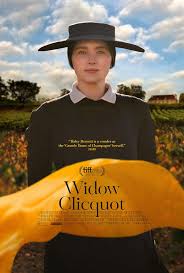
WIDOW CLICQUOT
UK, 2023, 90 minutes, Colour.
Haley Bennett, Tom Sturridge, Sam Riley, Ben Miles, Paul Rhys, Phoebe Nicholls, Cara Seymour, Nicholas Farrell.
Directed by Thomas Napper.
In case the “Clicquot” in the title did not immediately resonate, it would have been clearer had the filmmakers use the French for Widow, Veuve. And the champagne connection would have been made.
This is a comparatively brief film, 90 minutes. And, it is reminiscent of the style of previous decades BBC costume dramas, beautifully photographed, performances with great dignity, serious and even ‘important ‘issues of the past. Something of the stately treatment.
This may well appeal to an older audience, interested in the past, wondering about the origin of the champagne and who the widow was. Audiences who like the drama to get on with it may at times be very impatient.
Audiences like this reviewer, whom the date for this history was not immediately at the top of memory will be grateful for a mention of Napoleon and of 1811. Which means that France is involved in the Napoleonic wars, this story beginning only a year away from the retreat from Moscow, Napoleon will be returning, exiled, escaping, defeated at Waterloo. There are some glimpses of warfare in the distance from the vineyards. But, there are also Napoleon’s social reforms, the Napoleonic laws, codifications, regulations, and, here, especially about the role of women, property, commerce and development.
The setting then for Barbe Nichole, the widow of creative but disturbed, Francois Clicaquot, played by Tom Sturridge in a 19th century romantic, tragic style. This contrasts very much with Haley Bennett’s performance as Barbed Nichole, at times passionate in the flashbacks with her husband, enduring his eccentricities, grieving his death. But, she was a companion in his vision and talent for creativity in cultivating the vines, in developing the champagne, understanding the soil, the conditions, the blendings.
With the death of her husband, and a clash with her father-in-law, she decides to restore the impoverished vineyards, the loyalty of her workers, clashing with rivals, but engaging the help of a career salesman, travelling in Europe, Louis Bohne, a pleasantly charming Sam Riley. She stands firm against opposition, the men who are trying to dominate her, put her out of business, eventually bringing her to court, arguments about the Napoleonic law and the possibilities for women to administer the estates of their husbands.
With the screenplay championing creativity of a woman, standing against hostile men, creating a champagne which sold all over Europe, was favoured by the Tsar of Russia, has survived for centuries, is admirable, the audience might have appreciated this more with greater development of the character of Barbe Nichole that is presented in these 90 minutes.
- The title and audience knowledge of Veuve Clicquot? Of French champagne, development and experimentation in the 19th century, marketing and sales, the continuing tradition into the 21st century?
- Audience interest in the story of the background? A historical drama, the style of BBC television historical dramas? Costumes and decor, locations? Style of performance, style of dialogue?
- The structure of the film, the introduction to Barbe Nichole, her inheriting the Vineyards from her dead husband, his father wanting possession and selling the properties, the local rivals and their interest? Her decision to run the Vineyards herself? Her reliance on the workers, even when unable to pay them, the criticisms of the manager, his disdain for a woman in charge? And the importance of Louis Bohne and marketing and distribution?
- The development of the Vineyard, and the insertion of the flashbacks, the glimpses of François, his love for his wife, the daughter, his commitment to the Vineyards, sitting outside, singing to the vines, commending this to his wife? Successes and failures with the champagne? Continuing developments? His health, mental health, fewer explanations of his condition, as seen in the flashbacks with his wife and his devotion to her, his death, the funeral?
- Opening in 1811, the Napoleonic era, the wars, the March on Moscow in 1812 and the retreat, the glimpses of war and explosions over the horizon? Ultimately Napoleon’s defeat? However, the importance of Napoleonic social reform, legislation and codes? The issue of a woman inheriting? The issue of a woman running a business?
- The court case, the criticisms of the widow, her relationship with Louis Bohne, the accusation that she did not marry because she wanted to keep control according to the Napoleonic code? The speeches against her, the condemnations, the support of her accountant, of Louis, the presence of her father-in-law, her silence during the proceedings, the provision of love for her husband, to continue his tradition, her skills with the Vineyards, with developments for the champagne?
- Seeing her at work over the years, the long hours, the intervention of her mother, the support of her companion, the relationship with her daughter (and the memories with her father)? The friendship with Louis, his believing in her, his extensive travel, the contracts, the marketing, his shrewdness in preserving bottles, sending to Russia, the admiration of the Tsar? The difficulties over the years, her perseverance, ultimately success, the payment of the workers?
- A history of champagne, historical background? The portrait of a determined woman, in the 19th century, determination and achievement?
Clean/ US
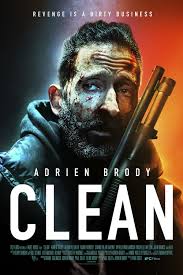
CLEAN
US, 2021, 94 minutes, Colour.
Adrian Brody, Glenn Fleshler, Richie Merritts, Chandler Ari DuPont, Mykelti Williamson, RZA.
Directed by Paul Solet.
- The title, expectations? The central character’s nickname? Working as a cleaner, the focus on the rubbish, saving some for repair, disposing of the rest? The rubbish on the New York streets? The imagery of the human rubbish on the streets, the need for cleansing the streets? The criminal gangs, working with the fish, smuggling the drugs, needing for cleansing? Michael, crime boss, brutality, going to church, confession, wanting some spiritual cleansing? The final mission for Clean?
- The New York streets, the neighbourhoods, at night, the darkness, the thugs in the street, the violence, the abandoned homes, the absence of families and children? The close-ups of the streets and the driving, the overviews of the lights at night? Atmosphere? Musical score?
- The central character, nickname of Clean, collecting the rubbish, driving, repairing the hoover, going to the pawn shop, the encouragement of the pawn shop, his living alone, preparing the food, the contact with Dianda, her grandmother, the conversations, the food, his going to the groups, listening? His visit to the barber, the wise advice, the friendship? His observing life around him?
- The enigma of his character, not knowing at the end and his reputation and action, his flashbacks, embrace and the little girl, the deaths?
- The thugs in the street, his pursuit, his being bashed, the hospital, not wanting painkillers? Continuing on? Continued repairs? The encounter with Michael, the stench, taking away the rubbish, including the body, not taking payment?
- Michael, the gangsters, the family, his subservient wife, disappointment with his son, wanting to make a man of him, the son getting out of jail, with his friends, the music, his father’s disdain? The confrontation with the Chinese, the smuggling of the drugs, not enough? The brutal murder, disposing of the body? The contrast with him being at church, listening to the gospel, later going to confession?
- Dianda, her age, going to school, with her grandmother, the grandmother’s reaction to Cleag? Her going off, with the group, Clean finding her, the drink and the drugs, Michael’s son present, the filming, his weapon, his bashing the men, including Mikey? Mikey, the doctor, warming to his father? His father not taking him to hospital?
- The buildup to the confrontation, Clean taking the grandmother and Dianda, seeing the corrupt policeman, Michael setting the bounty, the policeman and his pursuit, Clean and his evasion, at the diner, the women going to the toilet, his getting another truck, the thugs arriving, the confrontation?
- Clean, going to the pawnbroker, buying the guns, the flare? In the truck, driving into the house, the shootouts, the massacre, the confrontation with Michael, Mikey coming in, bandage, the gun, shooting his father, no more bullets for Clean?
- The aftermath? The women? Clean and his future?
- American violence, focus, drug dealing, guns, vigilantes’ action, vigilantes’ justice, violence and brutality?
Mysterious Ways
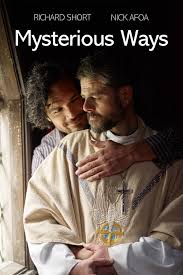
MYSTERIOUS WAYS
New Zealand, 2023, 90 minutes, Colour.
Richard Short, Nick Afoa, Joe Malu Folau, Michael Hirst, Becky McEwen, Maureen Fepuleai.
Directed by Paul Oremland.
As in… God moves in.
This New Zealand film takes on an issue in the Anglican Communion, not only the issue of the morality of homosexual behaviour, strongly disapproved of in African countries and African Anglican dioceses, but also the issue of same-sex marriage as well as Anglican priests in gay relationships and in marriages. While some of the dialogue indicates that this is something new in the Anglican Communion, there have been several precedents in the United States for some time.
The focus is on the parish of St John’s, the priest, Peter, a widower with an adult daughter, has acknowledged his orientation and is in partnership with a man Jason, whom he encountered in prison work, the man imprisoned for eight years for armed hold-ups. He is in rehabilitation, working with a group of young people in the parish, especially their football team.
The film shows the ordinary workings of the parish, preaching, baptisms, as well as the involvement with the youth group.
The priest also appears regularly on a radio program and the interviewer has raise the issues of gay relationships, the priest’s relationship and the question of marriage, eliciting an on-air proposal. The presses had discussions with the Bishop who is partly sympathetic but very conscious of the overall views of the Anglican communion.
There are quite some emotional issues, tensions, scenes of homophobia, scenes of support of the parishioners, the arrival of the priest’s daughter and her support of her father, the arrival of Jason’s aunt up in a more fundamentalist Christian perspective and discussions about the issue and family support.
There is also the arrival of a Samoan, Billy, the tradition of Fa'afafine and fa'afatama, fluid gender roles that move between male and female worlds. He is quite a flamboyant character, supportive, exhibiting the fluidity, especially in the performance of song and movement at the end, an enthusiastic and creative interpretation of Amazing Grace.
The screenplay does not raise in any detail the theological issues, the biblical background turning teaching on homosexuality, which limits its persuasiveness for either side of the discussion. The focus, very personalised and focused on Jesus himself, is on the importance of love in human life and relationships.
The final sense of this film is that the two men want to be married, and not be married officially in the church, but, with a gathering in a church, a woman with authority to preside at weddings, joins the couple for a celebratory ending of the film.
1. The title, God’s workings? In people’s lives, in issues of sexuality, particularly in the case of homosexual relationships and same-sex marriage?
2. The New Zealand setting, the city, the church, exteriors and interiors, meetings with the bishop, the radio station studio, the youth group and meetings, the football matches, the atmosphere of the Anglican church? The musical score, songs and hymns, the final spectacular based on Amazing Grace?
3. The situation of Anglican clergy, marriage, relationships? Same-sex relationships with the clergy? Marriage? The screenplay not presenting theological arguments? Biblical arguments? The issues of the tradition of the communion? The emphasis on Jesus, pastoral outreach? Love?
4. The character of Peter, his marriage, widower, his daughter, her support? Encountering Jason, Jason and his prison sentence, robbery, coming out, the love between the two? His working with the youth group? Samoan and Christian upbringing? His relationship with his aunt, her coming, approval and disapproval, the discussions, helping with the cake, at the final celebrations, her affirmation?
5. The Bishop, the stances of the Anglican Communion, differences around the world? Personal sympathy, the discussions with Peter, his reaction to Peter’s on-air proposal, the further discussions, taking a stance?
6. The personal relationship between Peter and Jason? The bonds, the proposal in the air, Jason’s reticence, his past, listening to the radio, the decisions by the Bishop, his feeling hurt, going away, with his aunt?
7. The arrival of Billy, the Samoan tradition, the fluid gender characters, his flamboyance, costumes, cheeriness, meeting people, support? The preparation of the wedding, his creativity, in the church, Amazing Grace and his variations? Symbolism of him as an Angel, shedding the various costumes and finally angelic? His disappearance, the story of his illness, his death, the book bequeathed to Peter and Jason?
8. The homophobia, the placard outside the church, the bashing of Jason, the young man from the group, his previous attitudes and disapproval, his running away?
9. The reconciliation between Peter and Jason, apologies, in the church, the celebration, the wedding celebrant emerging, the community support, the ceremony, the happy ending?
10. The realities of the issues within the Anglican Communion? This film contributing to the awareness, to the discussions?
Summer Camp/ 2024
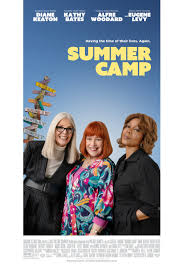
SUMMER CAMP
US, 2024, 95 minutes, Colour.
Diane Keaton, Kathy Bates, Alfre Woodard, Eugene Levy, Dennis Hayesbert, Beverly D'Angelo, Josh Peck, Betsy Sodaro, Tom Wright.
Directed by Castille Landon.
Usually this kind of title indicates an American summer, teenagers gathering and spending weeks away. And, this is how it begins.
So, alert to teenage audiences and their expectations, identifying with the first 10 minutes, especially teenage girls and the characters, issues, conflicts, friendships. But, the action then moves 50 years forward, offering them, perhaps, some images for their future. The vision of senior ladies.
And, so, an alert to the target audience, older women, perhaps memories of their past, watching this for 10 minutes and moving into a more familiar present. We have been introduced to the three central characters, Ginny with her voice-over and commentary, Mary, Nora.
And, 50 years later, Mary is accomplished in her work in the hospital. She is played by Alfre Woodard. Nora is a scientist with technology, addicted to her work. She is played by Diane Keaton repeating her performances in so many films recently, all the mannerisms and tics (and sometimes she wears Annie Hall type clothes!). Jenny is played by Kathy Bates with an extraordinary red Wing! He is the leader of the group, organise this reunion at the summer camp, but hard to persuade Nora to leave her work – and meeting up with the three rivals from 50 years earlier.
This is definitely a film for the target audience, older women. Younger audiences will not be particularly interested. And there are the token men, this time played by Eugene Levy (seriously rather than comic) and Dennis Hayesbert.
The women bond, Nora has to give up her work despite strong efforts to the contrary, Mary is visited by her dominating husband and they have a very serious confrontation (an effective scene), and Ginny is challenged in her controlling of people, which is her profession in helping people to well-being. So, on the rapids, Nora having to be rescued from the water, cheery sessions, touches of romance, a final confrontation and truth telling.
So, best reviewed by its target audience to see whether they identify, enjoy the comedy, the touches of romance, the confrontation.
[There are some good lines throughout, Ginny accused of being a psychopath but s noting that he was on a path! Some action with bows and arrows and a reference to the older men and the patriarchery. An introvert preferring to explore “the great doors”.]
- The title, the youth camp, the senior women’s camp?
- The atmosphere of the camp, dining, meeting rooms…? The countryside, the river rapids…? The musical score?
- The opening, familiar from youth camp films, the bonding of the three, the other three in-girls? Events, period, the three in the future?
- 50 years later, Mary and her work in the hospital and her expertise, 45 years married, the demanding husband, her children and pride? Friendship with the other two? Ginny Moon, single, effusive, voice-over, her work with people, her reputation? Cheery personality? Nora, academic, marriage and her husband dying, addicted to her work, science and technology? Not wanting to go on the reunion? The other two persuading her?
- The camp, the manager and her pleasant attitude, Vick in control, like a Sergeant Major, comic episodes, comic turns? Jimmy, awkward, the disasters in the dining room, redeeming himself on the rapids, his jobs, befriending the three women?
- The gang of the past, their confidence, meeting again, interactions, on the river, Jane and her leadership, the session with Ginny, her admitting of the truth, feeling liberated?
- Stevie and Tommy, the male presence, knowing the women in the past, their stories, Tommy and overseas work, Stevie and a heart attack and retirement? Mary attracted to Tommy, the pottery, being together? Nora attracted to Stevie, to retrieve the phone, being caught, the conversations, the time together?
- The conversations, the meals, on the rapids, Nora being rescued? Ultimately the courage for the jumping? The friendship, Nora and her continued work, their wanting her presence? Mary, the phone call to her husband, his arrival, the serious discussion with him about their 45 years? Ginny, the criticisms of the group, her being hurt, rehearsing her speech, the presentation, the absence, but late arrival, her breaking down, talking frantically?
- Serious talk, the discussions with Jimmy, Ginny hurting his feelings, employing him?
- A film for the target audience, some precarious experience for them, listening to senior ladies talking…?
Mother Teresa & Me
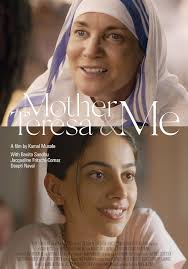
MOTHER TERESA & ME
India/Switzerland, 2022, 125 minutes, Colour.
Banita Sanduh, Jacqueline Fritzie-Cornaz, Shobu Kapopor, Deepti Naval, Bryan Lawrence.
Directed by Kamal Musale.
Mother Teresa of Kolkota, now a canonised saint, was a significant figure in India in the 20th century and, indeed, throughout the world. There have been many documentaries about her, three feature films where she has been played by Geraldine Chaplin, Olivia Hussey and Juliet Stevenson. Now another film? But one with some significant differences.
It can be noted immediately that the film was fully funded by donation and by grants from foundations, especially the Zariya foundation, established by the actress Jacqueline Fritschi-Cornaz and her husband. She was impressed on a visit to Kolkota many years earlier and they set up the foundation to help the Missionaries of Charity, and with the proceeds from the exhibition of this film. She asked the Indian director, Kamale Musale, Switzerland-based, to both write and direct the film about Mother Teresa.
In fact, there are two films in one, so to speak, here. And they are intercut with strong dramatic effect, and the two stories finally coming together.
The first story, of course, is that of Mother Teresa herself, seeing her as a Loretto sister, migrant from Albania, teaching, but impacted by the poor, especially in the streets of Kolkota in the immediate aftermath of World War II. She asks permission to work outside the convent school, permission eventually granted by the Archbishop of Kolkota, her work with one of the local priests to achieve the fulfilment of her request.
One interesting feature to note about this film is that it shows Mother Teresa’s work in Kolkota, nothing of her fame, connections with Pope John Paul II, world leaders, the Nobel Prize. The focus is solely on her meeting the poor, the response, the questions, some hostility, being joined by a school pupil, more sisters joining, some government assistance, the building up of the centre – and the realisation that whatever people think of Mother Teresa, for and against, she was actually there, with the poor, in the streets, for almost 50 years.
Jacqueline Fritschi-Cornaz plays Mother Teresa, not in a film star way at all, sometimes severe, certainly always determined, memories of her anguish of soul and struggles with faith, and the reality of the Kolkota streets with these sequences filmed in black and white, gradually some colour tinting until 1991 when her story is in full colour.
And, initially, audiences wondering about the second story. It is set in London, the 2020s, a young woman, Kavita, Indian background, a violinist. Very much a London woman of the 2020s, definite, outspoken, critical, reacting against her parents wanting to arrange a marriage for her, discovering that she is pregnant, her partner fearful and not helping, a lot of discussion about abortion and keeping children. So, contemporary audiences can resonate with the character and the issues. And all this is filmed in bright colour by contrast to the Kolkota black-and-white.
Kavita goes to India to stay with her aunt, discovering the work of the missionaries of Charity, talking with a young volunteer at an aspiring doctor, gradually becoming involved, sceptical, interested, discussions with her aunt, and some discoveries, learning more about Mother Teresa until the end where there is the revelation of a connection.
So, this is not just another film about Mother Teresa, worthy though that enterprise could be. It is an invitation to a 21st-century audience to look back on her work, the commitment of the Missionaries of Charity, a discussion of issues of poverty, interfaith dialogue, pregnancy, birth, abortion…
And, by the end, we have a good focus on Mother Teresa and her main work, and with the performance by Jacqueline Fritschi-Cornaz, images of her face, sometimes anguished, sometimes happy.
- Audience knowledge of Mother Teresa? Her reputation in the 20th century? In India? Nobel Prize? Worldwide? (In various documentaries, feature films about her?)
- This film for a 21st-century audience, a quarter of a century after her death? Her becoming part of memories? The decision to show her work in India, on the streets, none of the international connections or reputation? And Missionaries of Charity focus? The decision to make a 21st-century story, contemporary characters, issues, the work of the sisters in the 2020s, the meeting of the past with the present?
- The opening, Mother Teresa and her struggles with the sense of the presence of God? The background, Albania, the Loreto sisters, the convent, community life, teaching the wealthy girls, the classroom scenes? Her discoveries on the street, 1946, a sense of the presence of God, the voice of God asking her to move out, the discussions with the priest throughout the film, his reactions, his intervening with the Archbishop, the long time, the eventual permission for her to move? Her response?
- The decision to film these sequences in black-and-white, the gradual tinting of colour, full colour by 1991? And comparisons with the 21st-century colour?
- Moving out of the convent, choosing the sari, her habit, walking the streets, encountering the poor, good responses, suspicions, getting the children, teaching them, people donating goods for her teaching? The care for the ill, the dying? The impact on audiences of this work among the poor and the dying?
- The doctor, the cases, his showing the building, the hostility from the religious group, the leader? Her defying him? His coming inside, the religious issues, interfaith and God? (And the later scene in where he is dying and being cared for by sisters?)
- The development over the decades the young girl joining her from school, more nuns joining, the Missionaries of Charity?
- Mother Teresa and her spirituality, of service to the poor, but her own struggles, feeling the absence of God and God’s voice?
- The introduction of the modern story, its narrative, inserted into the stages of the work of Mother Teresa?
- Kavita, her age, music, the violin, her co-musician, the relationship? Discovering she was pregnant? Her response, the issue of abortion, her sense of independence? No help from her partner, his withdrawing? The sequence of her parents, the visit for the arranged marriage, the awkwardness, her walking out? The confrontation with her parents?
- Her going to India, the meeting with her aunt, the issues of the pregnancy, the issue of abortion, the arguments for and against? The pro-life issues?
- The aunt, religious background, not Christian, the flashbacks and seeing her as a little girl, invited to study with Mother Teresa, growing up, working with her, admiration for her?
- Kavita, in Kolkota, wandering, the poverty, the attitudes, the London background, reading the book, learning about Mother Teresa, in the hospital, the young volunteer, friendly, the discussions, his commitment, helping with the work? The growing effect on her?
- Mother Teresa, 1991, her age, the wear and tear of work, the birth of the baby, the aunt, the adoption?
- Kavita and her mother, the visit to India, the clashes, the two older women, the revelation of the truth, her adoption? The scenes with her mother and father, explaining the background and the adoption and love?
- The two stories coming together, the influence of Mother Teresa – and Kavita returning to London, committed to a music, the recital, meeting her musician friend again?
- The open end, the pregnancy, having the child, not…?
Hearts Eyes
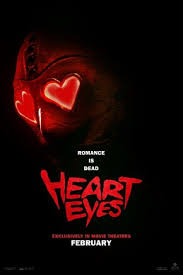
HEARTS EYES
US, 2025, 97 minutes, Colour.
Olivia Holt, Mason Gooding, Gigi Zumbado, Jordana Brewster, Devon Sawa, Yoson An, Michaela Watkins.
Directed by Josh Ruben.
Valentine’s Day movie. Yes, destined for repeats every February 14th.
Title. My Bloody Valentine already taken.
Heart Eyes – certainly a killer to rival Jason, Michael Myers, Scream franchise killer is, with a mask and red glowing heart eyes in the dark.
Slasher movie. Definitely
Romantic comedy movie. Definitely.
Combination of both. (Criticisms that the makers could not decide which was more important? The fact that the makers actually did and thought that both are important and combining them?
Blood. Lots.
Gore. Lots – and many more victims along the way rather than the main targets.
How serious? Serious but a lot of the time very much tongue-in-cheek.
The romantic couple? Definitely not at first, mutual dislike, rivalry. But danger bringing them together, a precarious route to falling in love.
Olivia Holt and Mason Gooding as the couple, she still sad about a breakup, potentially sacked because of her campaign strategy for selling jewellery (Love ends tragically with glimpses of Romeo and Juliet, Titanic, Bonnie and Clyde, and the southern-drawling boss threatening to sack her with Mason Gooding coming in as the expert, and their being told to work together…
The police. Their names Hobbs and Shaw, Jordana Brewster’s character saying that she had never seen the films. (In-joking reference.)
A recommendation – fans of romantic comedies might like all of that part, but may find the slashing too gruesome. Slasher fans might like the romantic comedy but, even if they do not, will be glad to put up with it because of the terror and horror.
Trivial Pursuit note: it was all filmed in New Zealand, Auckland.
- Valentine’s Day film? Slasher film? Romcom? Combined?
- The American city, apartments, board rooms, restaurants, unfair, police precincts and cells, interrogation? Drive-in? The musical score, the songs and the lyrics?
- The opening, combining romantic comedy with slasher, the couple, filming the proposal, repeats, the deaths, the killer and the mask? The information, Valentine’s Day, in past years, the deaths, the map? Seattle, apprehension and mood?
- Ally and Monica, their friendship, the past, chatter,Aally and her breakup, brooding, the phone and images, their work, the promotion, selling jewellery, love ending in death, Romeo and Juliet, Titanic, Bonnie and Clyde…? Meeting, Crystal and her southern drawl, condemnation?
- Ally, the special coffee, the encounter with Jay, bumping heads, his coming into the meeting, his talent and expectations? The command they work together? The discussions, Ally and her reactions, going shopping with Monica, the various dresses, her arrival, waiting for Jay, his being late, the talk, the sparring, rivalries? Her walking out? Meeting her ex and his girlfriend, the decision to kiss Jay, his response? And their being watched by Heart Eyes?
- Ally locked out, the taxi driver, Jay coming to help, breaking the window, cutting his hand, first-aid, Heart Eyes in the closet, emerging, the fights, fleeing, the killing of the taxi driver, Jay and his being hurt, Ally escaping, the funfair, hiding, turning on the carousel, the fights?
- The drive-in, watching Cary Grant and Rosalind Russell? Heart Eyes, the attacks, the couple hiding in the van and the sexual activities, the killings? The panic, the further deaths, the police, arresting Jay, the joke about Hobbs and Shaw and Jordana Brewster in the franchise? Hobbs and his fierce interrogation, Shaw taking over more congenial? Ally and her anxiety, waiting for information, the encounter with David, the IT man? Then the death of the officer at the desk?
- The continued mayhem, Jay and Ally, their talking, the final confrontation, the revelation about Shaw and David, the explanations of their behaviour, the death of their third associate, the buildup to the fights, the fire, the knives, and, ultimately, Ally’s conservation straw and killing Shaw?
- The romantic ending, sharing stories, telling the truth? And the postscript during the credits of Monica and her intervention, the photographing of the proposal?

